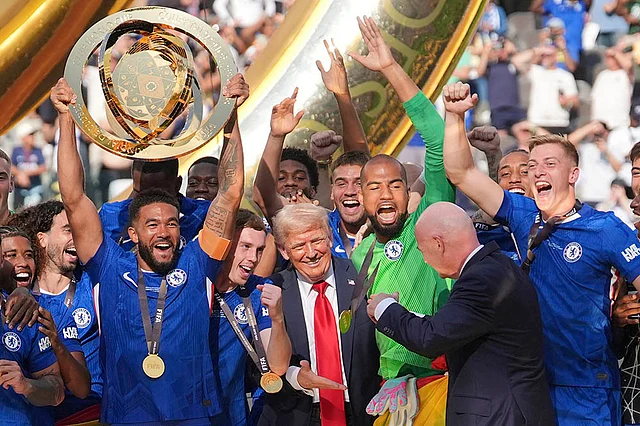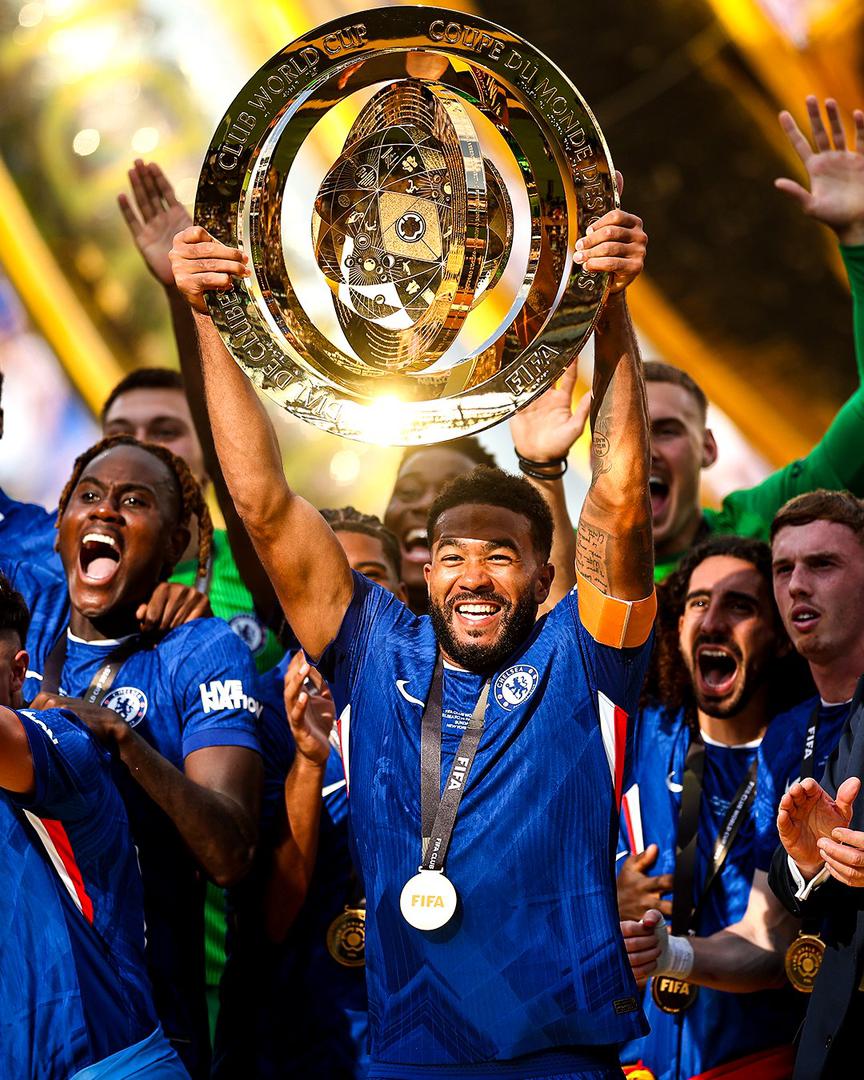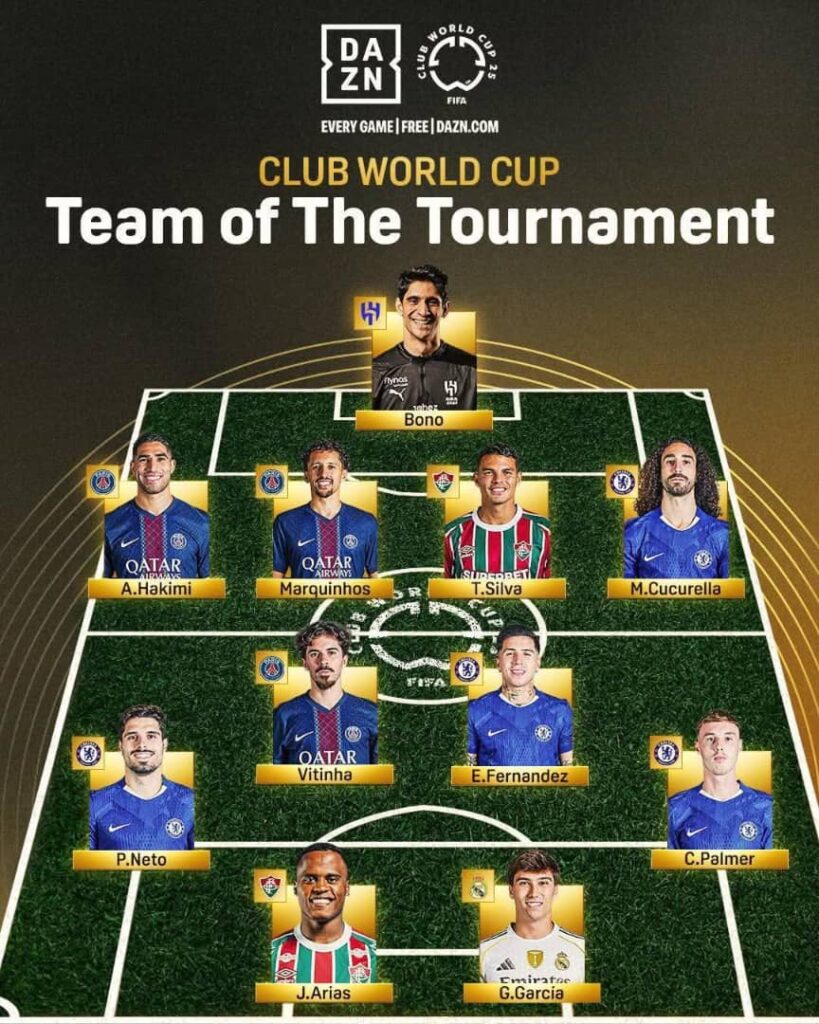Chelsea Football Club lifted the revamped Club World Cup trophy after a commanding 3-0 victory over Paris Saint-Germain in a fiery final at the MetLife Stadium in New Jersey. The win not only secured them global bragging rights but also capped off a highly lucrative campaign in a competition increasingly defined by its financial muscle.
While the Blues’ performance on the pitch was clinical, off-pitch tensions exploded in ugly scenes after the final whistle. The clash, marred by a dramatic brawl involving PSG coach Luis Enrique, goalkeeper Gianluigi Donnarumma, and Chelsea’s João Pedro, delayed the trophy presentation by half an hour and underlined just how high the stakes were—not just in footballing terms, but financially.
This was more than just a football tournament; it was a billion-dollar event that has reshaped the balance sheet of every club involved, with Chelsea emerging not just as champions but also as the biggest financial winners.
Palmer Shines, Chelsea Dominates
From the opening whistle, Chelsea looked the more prepared and composed side. Manager Enzo Maresca masterminded a high-pressing, possession-focused system that completely disrupted PSG’s rhythm. The midfield trio of Enzo Fernández, Moisés Caicedo, and Cole Palmer functioned with fluidity and precision, while the defense remained resolute against the sporadic attacks of Kylian Mbappé and Ousmane Dembélé.

Cole Palmer was the star of the show, scoring twice and assisting João Pedro in what turned out to be one of the most dominant individual performances in Club World Cup final history. For his efforts, Palmer was awarded the Golden Ball as the tournament’s best player. João Pedro and Liam Delap, both recent signings, showcased the strength of Chelsea’s youthful new core and justified their hefty transfer fees.
PSG, on the other hand, were left frustrated and eventually overwhelmed. Manager Luis Enrique, known for his fiery demeanor, was involved in a heated altercation post-match that quickly escalated, with players and staff from both sides joining in. The melee brought global attention—but not for the right reasons.
A New-Look Club World Cup: Money Talks
While Chelsea fans celebrated the sporting success, club executives around the world were more focused on the staggering financial rewards. The 2025 edition of the Club World Cup marked the first iteration of FIFA’s expanded format, featuring 32 clubs and a jaw-dropping $1 billion (£726 million) prize pot.
Of this total, $525 million was divided among clubs as participation fees, while $475 million was performance-based. For many clubs—especially those from smaller footballing markets—the money was transformative.
European clubs enjoyed the lion’s share. Participation money for UEFA representatives was calculated based on a weighted ranking system combining sporting and commercial criteria. As a result, clubs like Chelsea, Real Madrid, and Manchester City earned anywhere from $12.81 million to $38.19 million just for showing up. In contrast, clubs from South America received $15.21 million, North and Central America $9.55 million, and Oceania just $3.58 million.

Chelsea Tops the Financial Table
Chelsea emerged not just as champions but also as the tournament’s top earners, taking home a total of approximately £84 million. Runners-up PSG earned around £78.4 million, while other top European clubs averaged £39 million each depending on performance and participation bonuses.
Fluminense, who reached the semi-finals, ensured that South American representation was more than symbolic. They took home £24 million—an amount that significantly boosts the financial profile of Brazilian clubs still reeling from global inflation and local economic instability.
Even for clubs that failed to make it out of the group stages, the tournament provided significant windfalls. Five clubs, including Mexico’s Pachuca and the USA’s Seattle Sounders, lost all three group games but still earned their base participation fees.
But the biggest surprise story in financial terms came from New Zealand’s Auckland City.
Auckland City’s Jackpot Moment
Part-time club Auckland City earned a modest-sounding £3.3 million, but in relative terms, it was nothing short of a jackpot. Their annual revenue stands at just £488,000, meaning the Club World Cup earnings amounted to more than seven times their yearly income.
Football finance expert Kieran Maguire described it as a potential game-changer—“They have earned so much money that it’s difficult to see anybody being able to compete with them if they invest in the playing squad.” However, he also expressed concern for competitive balance in the New Zealand league, warning that such a windfall might create a monopoly in local football unless regulations are enforced.
Fuel for the Transfer Engine
For big European clubs, the prize money isn’t life-changing, but it’s certainly timely—particularly in the transfer market.
UEFA’s financial sustainability rules limit clubs to spending 70% of their revenue on player wages, transfer fees, and agent costs. That means every £50 million in fresh revenue allows for £35 million in spending flexibility.

Chelsea have already spent £198 million this summer, including on Joao Pedro and Liam Delap. Thanks to their £84 million Club World Cup windfall, a significant chunk of that outlay has been offset.
Borussia Dortmund also saw immediate benefits. Having reached the quarter-finals, the German club earned around £38 million—covering more than 65% of their summer transfer business, including the full fee for Jobe Bellingham from Sunderland.
Even Manchester City, who suffered a shock last-16 exit to Al-Hilal, pocketed £38 million, covering the cost of their £31 million signing of Rayan Aït-Nouri from Wolves.
Real Madrid, always strategic in their approach, reportedly paid Liverpool £8.4 million to secure Trent Alexander-Arnold a month early so he could feature in the tournament. That sum was covered after just three games.
A Double-Edged Sword for Clubs and Players
From a business standpoint, the Club World Cup has been a resounding success. Clubs are flush with fresh funds at a time when transfer market inflation is at an all-time high. As finance expert Maguire put it, “It’s welcome for the accountants at football clubs. The business will be happy.”
But he also issued a warning: “I’m not sure fans will be happy, particularly of European clubs, and it’ll be the same for players and managers. We’re reaching a crisis point as far as player welfare is concerned.”
With fixture congestion already affecting top leagues and international calendars, the addition of a month-long summer tournament risks pushing players beyond their physical limits. Injuries, burnout, and performance dips could follow, leading to tensions between club owners, coaching staff, and players themselves.
Maresca, while celebrating Chelsea’s global conquest, was quick to acknowledge the need for balance going forward. “It’s a proud moment for the club and the players. But we have to manage the physical side of things better next season. The calendar is only getting tighter.”
Legacy and What Comes Next
With this victory, Chelsea have now lifted every major trophy available to them: Premier League, FA Cup, League Cup, UEFA Champions League, Europa League, Conference League, Super Cup, and the old and new Club World Cups. Yet their domestic title drought, dating back to 2017, remains a lingering gap.

As they head into the new season with fresh confidence—and a bolstered transfer kitty—fans are daring to dream that this side could finally reclaim Premier League glory. But amid all the glitz, the Club World Cup’s new identity raises urgent questions: Is this the future of football—or the commodification of it?
The 2025 edition has proven one thing beyond doubt: the Club World Cup is no longer just a prestige event. It’s now a financial powerhouse reshaping global club football—and how teams plan, buy, and play.
Sources




